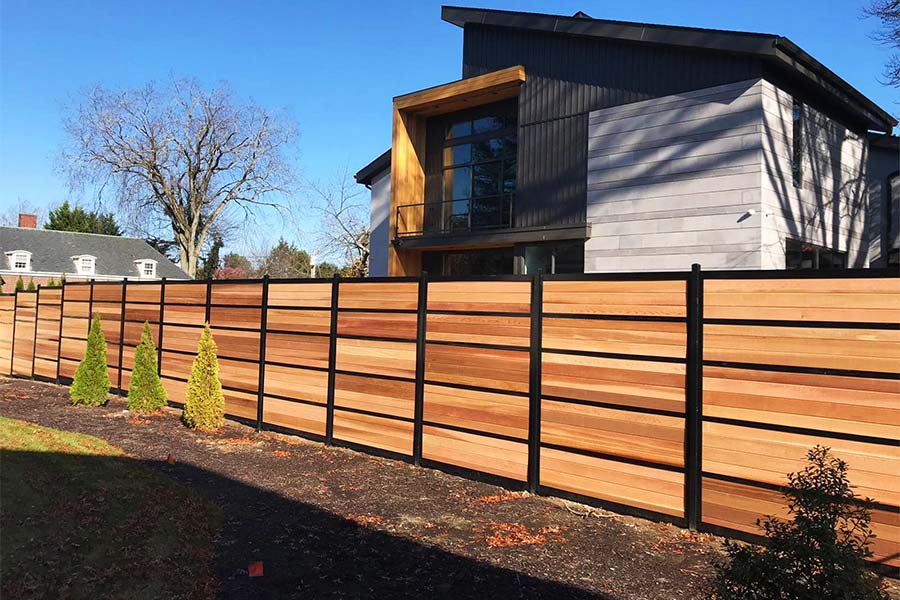All Categories
Featured

Selecting the right fence product is important for accomplishing the balance of sturdiness, aesthetics, and capability that matches your residential property. Timber, plastic, and light weight aluminum are prominent selections, each with special features that deal with specific needs. Right here's an extensive take a look at the advantages and disadvantages of these 3 materials.
Timber Secure Fencing. Pros:. Classic Allure: Wood provides an all-natural, classic look that enhances numerous architectural designs. Customizable: It can be painted or tarnished in a range of shades and styles. Economical: Wood fencings are often less expensive upfront than plastic or light weight aluminum. Eco-Friendly: As a renewable source, timber is sustainable and biodegradable when sourced sensibly. Disadvantages:. Maintenance-Intensive: Calls for routine staining, painting, or sealing to secure versus climate and pests. Shorter Lifespan: Relying on the sort of wood and environment, it generally lasts 10-15 years. Vulnerability to Damages: Prone to rotting, bending, and termite damage without correct care. Timber is excellent for home owners that value aesthetics and agree to spend effort and time in upkeep to extend its life.
Plastic Fencing. Pros:. Resilient: Resistant to insects, rot, and climate, vinyl keeps its structure in harsh conditions. Low Maintenance: Requires little upkeep beyond occasional cleaning. Long Life-span: Plastic can last 20-30 years without considerable wear or damage. Flexible Designs: Offered in different colors, appearances, and designs, consisting of options that simulate wood. Disadvantages:. Expensive Installment: Vinyl fences are extra costly to mount contrasted to timber. Breakable in Cold Weather: Vinyl can split in severe cold climates. Tough to Repair service: If harmed, whole areas may require substitute, which can be testing to match. Plastic fencing is a terrific selection for those focusing on durability and minimal maintenance, also if it features a higher upfront expense.

Aluminum Fence. Pros:. Rust-Resistant: Aluminum does not corrosion, making it suitable for damp or humid areas. Lightweight however Strong: Offers strength without being overly hefty, which streamlines installment. Reduced Maintenance: Calls for little even more than cleaning and periodic repainting. Long life: Aluminum fences can last for decades without considerable deterioration. Sophisticated Designs: Commonly made use of for attractive functions, aluminum includes class to any home. Cons:. High Preliminary Expense: Light weight aluminum fences are amongst the extra expensive alternatives. Limited Personal privacy: Usually created with open spaces, they do not obstruct sights or sound. Vulnerable to Dents: While tough, aluminum can be nicked or curved with hefty influence. Light weight aluminum is best matched for those that want a resilient, stylish fencing and don't require complete personal privacy.
Making the Right Choice. Each product has its weaknesses and strengths:

Timber is best for eco-conscious customers and standard aesthetics who do not mind upkeep. Plastic helps home owners seeking a weather-resistant, low-maintenance option. Aluminum is a sturdy, decorative option for those who desire elegance and longevity. Consider your concerns-- whether it's expense, personal privacy, upkeep, or appearance-- and consult a secure fencing specialist to select the material that finest meets your requirements. A well-selected fencing will certainly improve your residential or commercial property for many years to find.
Latest Posts
Learn How to Cut Costs on Car Maintenance with Montclare Auto Repair’s Limited-Time Deals
Published en
1 min read
Uncover Save Big on Car Maintenance with Montclare Auto Repair’s Exclusive Deals
Published en
1 min read
Experience Your Financial Partner at WyHy – Top Perks for Your Future
Published en
1 min read
More
Latest Posts
Learn How to Cut Costs on Car Maintenance with Montclare Auto Repair’s Limited-Time Deals
Published May 28, 25
1 min read
Uncover Save Big on Car Maintenance with Montclare Auto Repair’s Exclusive Deals
Published May 27, 25
1 min read
Experience Your Financial Partner at WyHy – Top Perks for Your Future
Published May 24, 25
1 min read